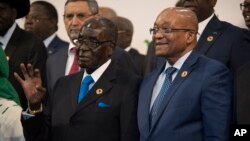African leaders say development is essential to stop the blood-soaked tide of desperate African migrants who are fleeing the continent.
Thousands of kilometers from the plush environs of the African summit, more than 100,000 African migrants in tiny, barely watertight boats have recently crossed the treacherous waters of the Mediterranean in a desperate bid for a new life in Europe.
The International Organization for Migration estimates that more than 102,000 people have attempted such a voyage this year alone. Most migrants come from sub-Saharan Africa. But not all have made it: more than 1,800 have drowned in the Mediterranean this year.
Regional leaders at the African Union summit, held this year in South Africa, say the problem starts at home. Migrants often say they are fleeing problems like conflict, unemployment and unfair treatment at home. South African President Jacob Zuma said leaders are responsible for this.
“In recent times we have all witnessed painful and shameful images of our African brothers, sisters, mothers, fathers and children dying during unsafe passage across the Mediterranean Sea trying to reach the shores of Europe in order to find better sanctuary from wars, poverty, abuse and unemployment among others. This is an indictment to all of us and calls for us to realize that although we have done so much to improve the living standards of our people, there is a need to double our efforts and ensure that our people are pulled to their motherland and contribute towards its development,” Zuma said.
African Union chairwoman Nkosazana Dlamini-Zuma, said there is hope , if African nations commit to development.
“If we educate and skill our people, with an emphasis on science, engineering, technology, math resource and innovation, including technical and vocational skills, our people will stop undertaking the perilous journeys across the Sahel and the Mediterranean sea,” stated Dlamini-Zuma. ”When we undertake this skills revolution, extremists, armed groups and terrorists will find it difficult if not impossible to recruit our young women and men.”
Zuma said he believes Africa has what it takes. “Africans have contributed its fair share towards the growth of humanity and remains one of its greatest assets. Africans possess all the attributes, resources and skills to live better lives than today. We just need to double our efforts and offer the next generations a future they will be proud of,” he said.
But this pressing topic, which was originally promised to be one of the main points of discussion at the two-day meeting of African heads of state, has been overtaken by controversy over the arrival of Sudanese President Omar al-Bashir.
Bashir is the target of an international arrest warrant that compels South Africa, as a member of the International Criminal Court, to detain him. South Africa has said he is a guest and enjoys diplomatic immunity as a participant in the summit.
A South African court issued an urgent order to keep him in the country until his arrest appeal could be heard, but his plane was seen leaving, without any problems or hindrance, on Monday.













